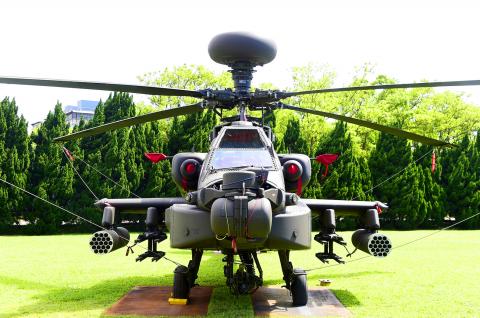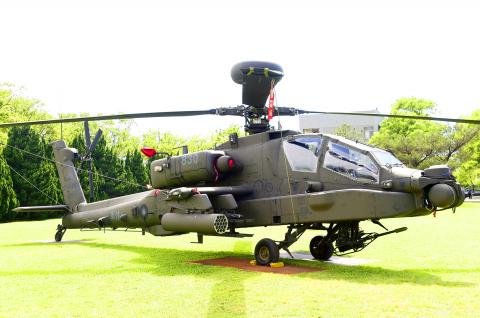The Republic of China Army 601st Air Cavalry Brigade is to formally become the first air brigade to be fully equipped with Boeing Co AH-64E Apache attack helicopters following a ceremony on Wednesday next week, a Ministry of National Defense official said yesterday.
President Tsai Ing-wen (蔡英文) is to officiate at the ceremony, which is being planned by the Army Command Headquarters, the official said on condition of anonymity.
Other distinguished guests would also attend the ceremony, where the helicopters’ capabilities would be demonstrated, he added.

Photo: Pan Shao-tang, Taipei Times
Some officials have said that in addition to Boeing representatives, several officers from the US Army’s 25th Combat Aviation Brigade, the air brigade’s sister unit, would also attend the ceremony.
When asked for comment, the ministry and headquarters declined to confirm or deny the claim, citing the sensitive nature of Taiwan-US relations.
The 601st and 602nd Air Cavalry brigades operate under the Army Aviation and Special Forces Command, with the former fielding all 29 of Taiwan’s serviceable Apaches and the latter fielding older AH-1W Cobra attack helicopters.

Photo: Pan Shao-tang, Taipei Times
Responsible for the defense of northern Taiwan, the 601st has two combat aviation squadrons that provide air support as part of the army’s air-land combined arms strategy, alongside armor, artillery, special forces and infantry units.
The first squadron, which has recently passed operational readiness evaluations, is tasked with training new Apache pilots in addition to its regular duties, the official said.
As the second squadron was declared operational in July last year, the entire brigade is now combat-ready, he said.
The Apache attack helicopter is a mobile and powerful weapons platform armed with a 30mm chain gun and, depending on the mission, a mixture of Hellfire anti-tank missiles, 2.75-inch Hydra rockets and Stinger air-to-air missiles, he said.
The Apache E variant’s most significant equipment is the Longbow fire-control radar located on top of the rotor mast, which provides day-and-night, all-weather, 360-degree search capabilities for air and ground targets, the official said.
The helicopter can simultaneously track 128 targets and engage 16 of them, making it more lethal and more likely to survive, he added.
Each Apache E can designate targets and extend air combat control to up to three other gunships, which means that the army does not need to equip all the helicopters with Longbow radar, he said.

MAKING WAVES: China’s maritime militia could become a nontraditional threat in war, clogging up shipping lanes to prevent US or Japanese intervention, a report said About 1,900 Chinese ships flying flags of convenience and fishing vessels that participated in China’s military exercises around Taiwan last month and in January last year have been listed for monitoring, Coast Guard Administration (CGA) Deputy Director-General Hsieh Ching-chin (謝慶欽) said yesterday. Following amendments to the Commercial Port Act (商港法) and the Law of Ships (船舶法) last month, the CGA can designate possible berthing areas or deny ports of call for vessels suspected of loitering around areas where undersea cables can be accessed, Oceans Affairs Council Minister Kuan Bi-ling (管碧玲) said. The list of suspected ships, originally 300, had risen to about

DAREDEVIL: Honnold said it had always been a dream of his to climb Taipei 101, while a Netflix producer said the skyscraper was ‘a real icon of this country’ US climber Alex Honnold yesterday took on Taiwan’s tallest building, becoming the first person to scale Taipei 101 without a rope, harness or safety net. Hundreds of spectators gathered at the base of the 101-story skyscraper to watch Honnold, 40, embark on his daredevil feat, which was also broadcast live on Netflix. Dressed in a red T-shirt and yellow custom-made climbing shoes, Honnold swiftly moved up the southeast face of the glass and steel building. At one point, he stepped onto a platform midway up to wave down at fans and onlookers who were taking photos. People watching from inside

Japan’s strategic alliance with the US would collapse if Tokyo were to turn away from a conflict in Taiwan, Japanese Prime Minister Sanae Takaichi said yesterday, but distanced herself from previous comments that suggested a possible military response in such an event. Takaichi expressed her latest views on a nationally broadcast TV program late on Monday, where an opposition party leader criticized her for igniting tensions with China with the earlier remarks. Ties between Japan and China have sunk to the worst level in years after Takaichi said in November that a hypothetical Chinese attack on Taiwan could bring about a Japanese

The WHO ignored early COVID-19 warnings from Taiwan, US Deputy Secretary of Health and Human Services Jim O’Neill said on Friday, as part of justification for Washington withdrawing from the global health body. US Secretary of State Marco Rubio on Thursday said that the US was pulling out of the UN agency, as it failed to fulfill its responsibilities during the COVID-19 pandemic. The WHO “ignored early COVID warnings from Taiwan in 2019 by pretending Taiwan did not exist, O’Neill wrote on X on Friday, Taiwan time. “It ignored rigorous science and promoted lockdowns.” The US will “continue international coordination on infectious